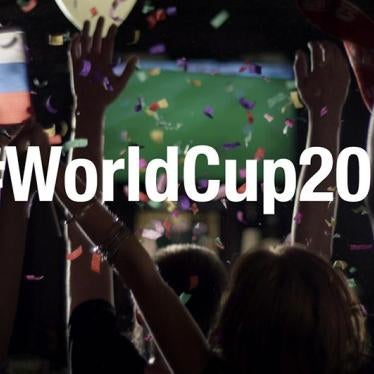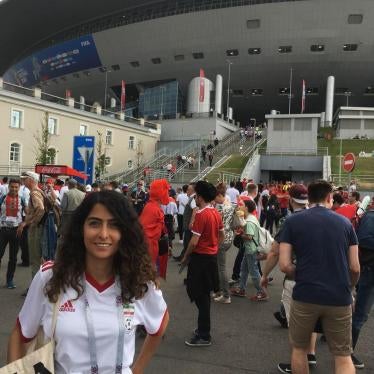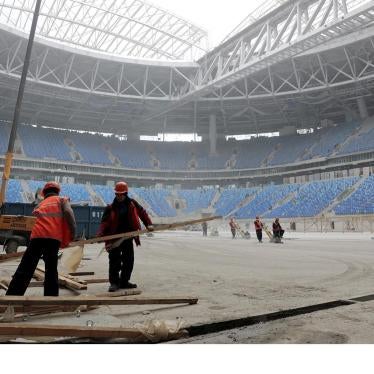|
Letter
Response from FIFA Regarding the Abuse of LGBT People in Chechnya and Threats Against Journalists
Human Rights Watch
Football Supporters Europe
Terre des Hommes
Transparency International Germany
Zurich, 22 May 2017
SG/fad/agr
Re: Your letter regarding abuse of LGBT people in Chechnya and threats against journalists
Dear members of the Sports and Rights Alliance, dear Ms Worden,
Thank you for your letter regarding the abuse of LGBT people in Chechnya and related threats against journalists of Novaya Gazeta. As the issues of anti-discrimination and press freedom related to our events are under the responsibllity of the FIFA administration, President Infantino has asked me to respond to your inquiry.
FIFA is following with concern the reports you refer to in your letter. As you are well aware, in article 3, FIFA's Statutes enshrine our commitment to respecting and promoting the protection of human rights. Furthermore, article 4 of the FIFA Statutes prohibits discrimination of any kind, including based on sexual orientation. The incidents raised in your letter and further detailed in various media reports are in sharp contradiction to the values of FIFA as an organisation and we firmly condemn them, irrespective of the fact that they are not directly related to FIFA's activities. FIFA therefore welcomes the decision by the Russian authorities to conduct an official investigation into the situation and will study its results with interest.
FIFA is aware of the risks that, through the organisation of its tournaments, it may become involved in adverse human rights impacts in relation to anti-discrimination and press freedom. FIFA also recognises that the broader human rights situation in a host country may adversely impact its tournaments. The FIFA Confederations Cup 2017 and the 2018 FIFA World Cup Russia™ are no exceptions in that regard. Based on its statutory commitments on human rights and anti-discrimination, and in line with the UN Guiding Principles on Business and Human Rights, FIFA is therefore taking a series of steps to prevent and mitigate potential adverse impacts in relation to the right to non-discrimination and press freedom.
Please let me elaborate on this work in some more detail:
Anti-discrimination
FIFA expects that all guests of a FIFA World Cup host country, whether they are fans, officials or media, are treated equally, irrespective of their sexual orientation. Russia has committed to provide all visitors and fans with a warm welcome and FIFA is convinced that the 2018 FIFA World Cup hosts will deliver on this promise.
In support of this ambition, FIFA is taking a series of steps in line with its strategic approach to diversity and anti-discrimination. In its Sustainability Strategy for the 2018 FIFA World Cup, FIFA has identified, together with the Local Organising Committee (LOC), inclusivity and equality as one of the key areas to be addressed in the preparation and hosting of the upcoming tournaments in Russia. As part of their efforts in that regard, FIFA and the LOC are working to ensure that FIFA World Cup sites and events are discrimination-free environments, including concerning discrimination based on sexual orientation.
FIFA is for instance carrying out a range of training and awareness raising activities on anti-discrimination related to the tournaments in Russia. These include holding in-person training sessions with relevant FIFA and LOC staff, referees, general coordinators, match commissioners, security officers, stewards, volunteers, and staff selling food and beverages ahead of the tournaments. The training sessions are carried out by FIFA’s Diversity and Anti-Discrimination Manager or with his close guidance and supervision. Moreover, FIFA will organise a series of projects to raise awareness on anti-discrimination, including at the specifically dedicated Anti-Discrimination Days. At the FIFA Confederations Cup 2017, these will be the days of the semi-finals. Respective activities include for instance that the captains of the teams involved will read out a message on anti-discrimination and equality immediately before the matches start.
Furthermore, FIFA will implement a series of activities specifically targeted to prevent and address discriminatory incidents in the stadiums. First, FIFA will systematically check for discriminatory items at the entrance gates and remove any such item found. To that end, the security personnel will be able to draw on immediate support from anti-discrimination experts. Second, FIFA will use proactive and reactive stadium announcements to prevent and respond to discriminatory behaviour at both the FIFA Confederations Cup 2017 and the 2018 FIFA World Cup. And third, in order to identify and, where necessary, sanction discriminatory incidents in stadiums, FIFA will be implementing its Anti-Discrimination Monitoring System. The Monitoring System is carried out in collaboration with the Fare network, a NGO-network working to combat racism and discrimination in football. As part of the Monitoring System, independent observers are present in the stadiums and submit reports about discriminatory incidents, which then serve as a basis for FIFA-intemal disciplinary procedures and potential sanctions of Member Associations. The Monitoring System was initiated during the FIFA World Cup qualification stage and has led to a series of sanctions in recent months, including several ones for homophobic incidents.
In addition to these event-specific measures, FIFA is, as part of its wider efforts to anchor anti-discrimination among its Member Associations, in close contact with the Russian Football Union (FUR). FUR implements a series of anti-discrimination measures, following guidance from FIFA’s Good Practice Guide on Diversity and Anti-Discrimination. In view of the upcoming tournaments, FIFA has intensified its engagement with the FUR to advise them on the implementation of their measures.
Press freedom
Freedom of the press is of paramount importance to FIFA. FIFA therefore always aims to provide media representatives with the best possible conditions for free coverage of all its events. Given the high media interest in FIFA’s tournaments and in particular the FIFA World Cup, FIFA acknowledges the risks of being linked to adverse human rights impacts involving media representatives.
In our efforts to help protect the freedoms of media representatives, FIFA follows an approach of respect and non-interference with the work of media representatives and takes adequate measures where their freedoms are put at risk as part of their work in relation to FIFA. This also includes using its leverage with respective authorities. To date, FIFA takes such measures on a reactive and ad hoc basis. It is however currently looking into ways of addressing the issue in a more pro-active and systematic manner.
We look forward to further engaging with all organisations of the Sports and Rights Alliance on our human rights work, be it through the Human Rights Advisory Board, the Mega-Sporting Events Platform or as part of exchanges on specific topics.
Please do not hesitate to contact our Human Rights Manager Andreas Graf (andreas‚graf@fifa.org) in case you would like to discuss any of the above in more detail.
Yours faithfully,
FÉDÉRATION INTERNATIONALE
DE FOOTBALL ASSOCIATION
Fatma Samoura
FIFA Secretary General
Your tax deductible gift can help stop human rights violations and save lives around the world.
Tags
Most Viewed
-
November 25, 2019
A Dirty Investment

-
June 3, 2025
“They’re Ruining People’s Lives”

-
December 21, 2023
Meta’s Broken Promises

-
January 25, 2024
“We’re Dying Here”

-
February 19, 2018
“All We Want is Equality”



